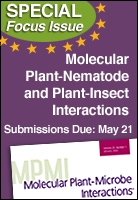|
MPMI's Editor's Pick
Dr. Gary Stacey, Editor-in-Chief
 N-Terminal Motifs in Some Plant Disease Resistance Proteins Function in Membrane Attachment and Contribute to Disease Resistance. N-Terminal Motifs in Some Plant Disease Resistance Proteins Function in Membrane Attachment and Contribute to Disease Resistance.
Identifying the cellular location of pathogen recognition is important to understanding the molecular basis of disease resistance. In the March issue of MPMI, Takemoto et al. used protein-GFP fusions of several known disease resistance proteins to investigate their cellular locations. The results showed that although most localized to the plasma membrane, others were found in the endomembrane system. The authors postulate that the location of each protein may reflect its specific function, including interaction with other proteins. Read more... |
TECHNICAL ADVANCE
MGOS: Development of a Community Annotation Database for Magnaporthe oryzae
Anupreet Kour, Kevin Greer, Barbara Valent, Marc J. Orbach, and Carol Soderlund
 Magnaporthe oryzae causes rice blast disease, which is the most serious disease of cultivated rice worldwide. These authors previously developed the Magnaporthe grisea-Orzya sativa (MGOS) database as a repository for the M. oryzae and rice genome sequences together with a comprehensive set of functional interaction data generated by a major consortium of U.S. researchers. The MGOS database has now undergone a major redesign to include data from the international blast research community, accessible with a new intuitive, easy-to-use interface. MGOS is now poised to become a one-stop repository for all structural and functional data available on all genes of this critically important rice pathogen. Read more... Magnaporthe oryzae causes rice blast disease, which is the most serious disease of cultivated rice worldwide. These authors previously developed the Magnaporthe grisea-Orzya sativa (MGOS) database as a repository for the M. oryzae and rice genome sequences together with a comprehensive set of functional interaction data generated by a major consortium of U.S. researchers. The MGOS database has now undergone a major redesign to include data from the international blast research community, accessible with a new intuitive, easy-to-use interface. MGOS is now poised to become a one-stop repository for all structural and functional data available on all genes of this critically important rice pathogen. Read more... |
|
Call for Papers - Special MPMI Focus Issue!
Molecular Plant-Nematode and Plant-Insect Interactions
Special Guest Editors: Dr. Geert Smant, Dr. Saskia Hogenhout, Dr. Melissa G. Mitchum
 Molecular Plant-Microbe Interactions Molecular Plant-Microbe Interactions invites original research manuscripts on the molecular biology and molecular genetics/genomics of parasitic interactions of
nematodes and insects with plants for a special 2012 issue. This special issue will bring added attention to critically important research that has shown significant progress in recent years. Three mini-reviews written by key scientists in the field will cover 1) nematode salivary proteins/effectors, 2) aphid salivary proteins/effectors, and 3) nematode-induced feeding structures. Click here for more information on publishing your research in the MPMI Focus Issue |